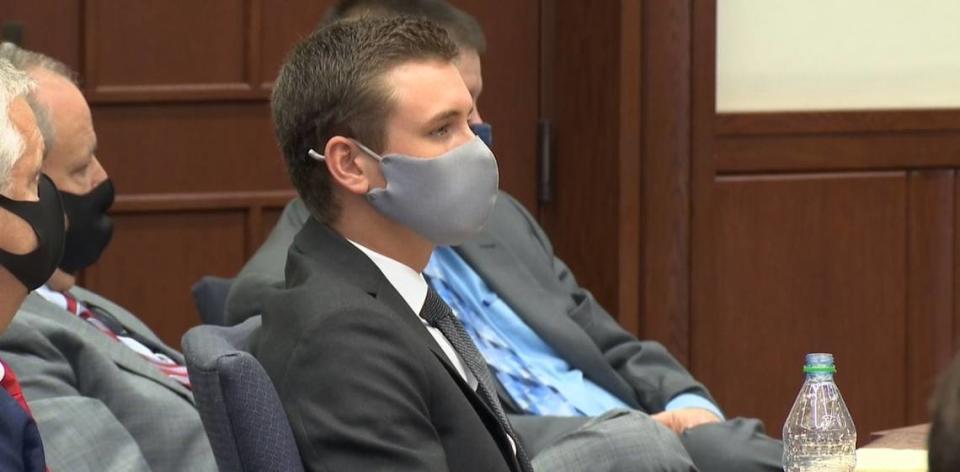Was child’s death an accident or reckless homicide? Jury deliberates Lexington case
A Lexington jury has started deliberating to determine if former University of Kentucky student Jacob Heil was at fault in the death of 4-year-old Marco Shemwell.
Heil was charged with reckless homicide and DUI after hitting Marco while Marco was walking with his father and brother. The three were leaving a Sept. 15, 2018, UK football game. Heil had been at a fraternity party and drank at least two beers earlier in the day, according to court testimony and the police investigation.
Jurors started to mull the charges about 11:40 a.m., following closing statements from prosecutors and defense attorneys.
In its closing remarks Thursday, Heil’s defense team presented two primary arguments: Heil wasn’t impaired while driving and Marco was in the street when the crash happened. One of Heil’s attorneys, Steve Schroering, said Marco’s presence in the road made this case a tragic accident, not a crime.
“In Kentucky, we don’t punish people — we don’t convict them of homicide for accidents,” Schroering said.
The police investigation determined that Marco was in the street at the time of the crash, according to officer Greg Marlin’s testimony. But police also found that Heil had crossed over the white line on the edge of the road. He was partially out of the lane when the crash happened, police said.

“Marco Shemwell was a beautiful, wonderful, perfect little boy,” Schroering said. He added that his death was “catastrophic.”
But the crash was an accident and the justice system can’t blame Heil based on the evidence presented, Schroering said.
Schroering acknowledged that Heil drank beer the day of the crash and said “he’s guilty” of the DUI charge. But Schroering also emphasized that multiple witnesses testified that Heil didn’t appear to be impaired when they saw him that day.
Those witnesses included other people at the Alpha Tau Omega party and bystanders at the crash scene.
Heil’s blood-alcohol content was 0.038 after he was arrested and taken to the Lexington-Fayette County Detention Center, according to a blood test completed by the Kentucky State Police crime lab. His blood-alcohol content at the time of the crash was likely 0.061 or higher, according to the testimony of Dr. Gregory James Davis, a UK doctor.
Schroering said Heil’s blood-alcohol content was an “incredibly small number.” But the legal limit for a driver under 21 is 0.02. Heil was 18 at the time of the crash.
Prosecutors: Marco’s death ‘was avoidable,’ Heil at fault
Assistant Commonwealth’s Attorney Brad Bryant said Schroering’s attempts to classify Marco’s death as an accident were wrong.
“The defense wants to characterize this case as a horrific, tragic accident. But that’s not what this is,” Bryant said in the prosecution’s closing argument. “ ... This was avoidable.”
Bryant said Heil had a responsibility to try to avoid Marco, and he knew Marco was at the side of the road. Bryant said he believed Marco wasn’t in the street based on the testimony of Ben Shemwell, Marco’s father, and Crystal Johnson, a witness to the crash.
Bryant said even if Marco was in the road, Heil had space to avoid him.
“He didn’t jerk the wheel, he didn’t steer away” because Heil was impaired, Bryant said.
Bryant also argued that most of the witnesses who said Heil didn’t seem impaired weren’t reliable. Two of those witnesses were also drinking at the frat party.
Bryant said Heil made a series of poor decisions leading up to the crash and Marco “paid the price.”
Bryant said Heil was sleep-deprived going into that day. Heil told police he stayed up until 4 a.m. that morning studying, then got up at 6 a.m. to prepare for the Alpha Tau Omega frat party at an off-campus house.
He drank at least two beers that morning before someone else drove him to the ATO fraternity house, then he had “sips” of beer at the fraternity house, according to statements he made to police. Shortly after, he decided he was OK to drive.
Bryant said Heil should’ve realized that he shouldn’t drive because of the drinking, and Heil should have been aware that there would be many pedestrians because it was game day.
“A reasonable person wouldn’t drive in that situation.”
If the jurors find Heil guilty of reckless homicide, he could face one to five years in prison.

